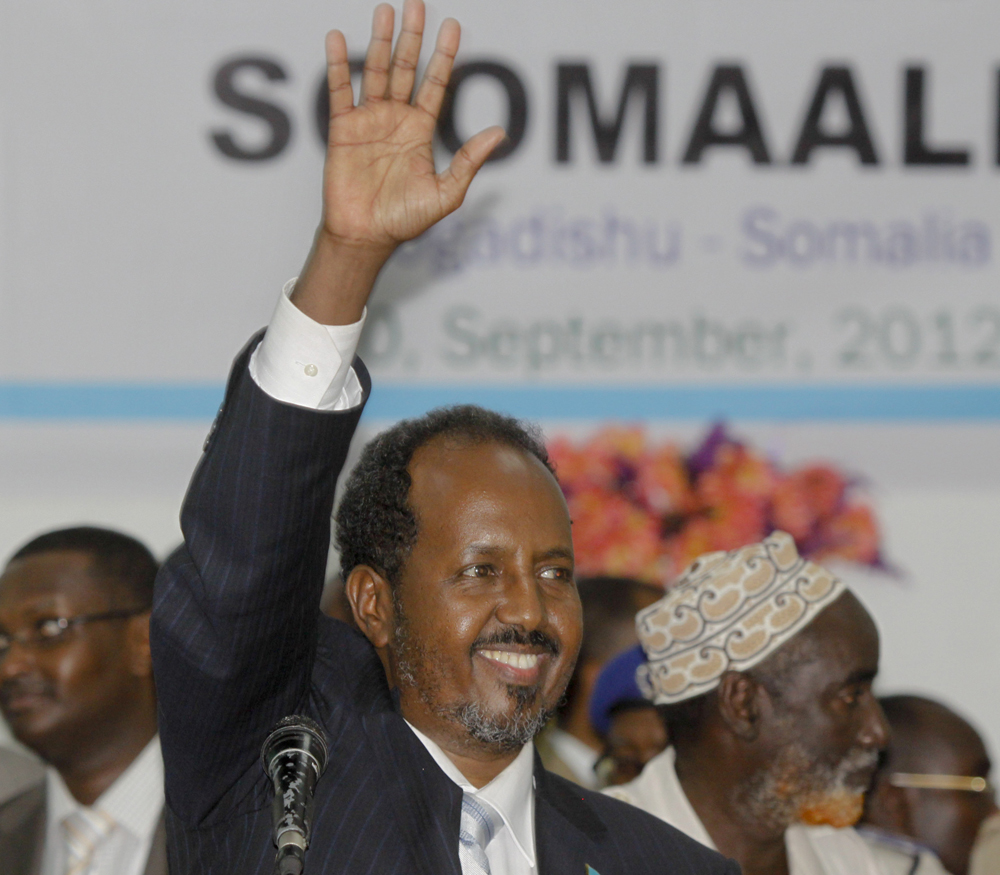
Hassan Sheikh Mohamud was sworn in as Somalia’s new president on Sunday, just days after already facing his first assassination attempt in an attack claimed by the al-Shabaab militia. Somalia’s parliament voted to elect Hassan as the country’s leader on September 10, officially marking the end of the Transitional Federal Government, or TFG. The United Nations established the TFG in 2004 to pave the way for a new central government—the first since the last government fell in 1991.
The new president is a political outsider. He’s an academic and civic activist who worked for Unicef and later co-founded the Somali Institute of Management and Administration Development in Mogadishu, which became Simad University. In 2011, he founded the Peace and Development Party, which he continues to represent.
The fact that Hassan Sheikh is new to Somali politics is perceived as a benefit by many civilians, who relate to him as a nonpolitician and hope he will turn the country around. The newly elected president has promised to move the country beyond divisive clan politics.
“In a clan setting, you can only produce a clan leader; you cannot produce a national leader," he told Voice of America. "Here, in the political parties, we intend to produce national leaders. Our main focus is that."
Somali and international commentators criticized the series of selection processes over recent weeks for members of Parliament, speaker of Parliament, and president, as marred by corruption. However, many also recognized the process as a necessary step towards stability and democracy.
The presidential election was not directly representative of the Somali population, as the members of Parliament were chosen by a selection committee overseen by international observers, not through elections.
The White House commended the Somali people for completing this momentous political transition but notably refrained from mentioning “elections” or “democracy” in its press statement. Instead, the statement congratulated Hassan Sheikh on winning the support of Parliament and becoming Somalia’s new president. Further, it called on Somalia’s leaders to bring about a new era of responsive, representative, and accountable governance. The statement said:
We encourage President Hassan and all members of Parliament to be inclusive and collaborative, and to build on today’s vote by continuing to strengthen democratic institutions, improving stability and security, and bringing tangible improvements to the lives of Somalia’s citizens.
Though shadowed by accusations of political interference and corruption, the elections mark the country’s first peaceful transition of power in 40 years.
Hassan Sheikh will replace outgoing President Sheik Sharif Sheikh Ahmed, whose government was accused of extensive corruption and supporting pirates in the Gulf of Aden. (None of the 22 presidential candidates received the necessary two-thirds of votes in the first round, so the election went to a run-off between the incumbent and Hassan Sheikh.)
Challenges for the New President
Election issues aside, Hassan Sheikh now takes control of an incredibly troubled country. Somali security forces, aligned with the African Union peacekeeping force AMISOM, continue to try to wrest control of the country from the al-Qaeda-aligned Islamist al-Shabaab militia.
In August 2011, al-Shabaab was forced out of the capital city Mogadishu. However, Hassan Sheikh’s new government only controls about one fifth of the country, presenting a unique and daunting challenge for the new leader.
“The question is not so much whether Mohamud is up to the job, it’s whether anyone at all would be up to it,” said Ahmed Soliman, Somalia researcher for the Chatham House think tank in London.
On just his second day on the job, two suicide bombers targeted Hassan Sheikh as he gave a press conference alongside Kenya’s foreign minister on September 13. Eight people were killed as the bombers entered the hotel, but the president escaped safely. Al-Shabaab claimed responsibility for the attacks, claiming the election is just another example of Western manipulation.
The humanitarian situation in Somalia remains critical. According to the United Nations, 2.1 million Somalis still need food aid. To ensure that aid is delivered to its intended recipients, Hassan Sheikh must focus on reducing corruption, as a recent particularly damning report by the United Nations alleged that 70 percent of international aid sent to Somalia between 2009 and 2010 ended up in a politician's pocket.
For more on Somalia and its history, read: "Somalia: Challenges to Dictatorship through Black Hawk Down, 1976-1990s," "Somalia: Civil War Years, 1990s to Present," and "Somalia: What is al-Shabaab?."
Photo: Somalia's new President Hassan Sheikh Mohamud (AP/Farah Abdi Warsameh).

